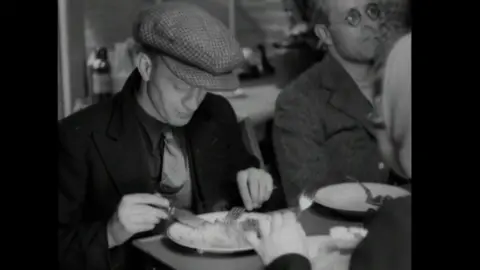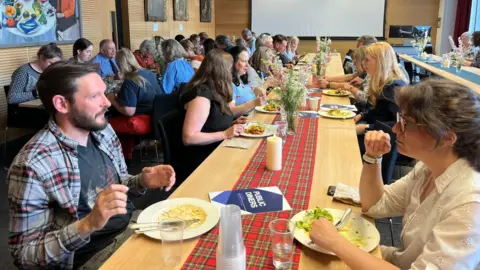Could taxpayer-funded public diners be revived?
Campaigners have called for the return of subsidised civic restaurants which would provide cheap, nutritious meals in a bid to improve the nation's health.
Thousands of diners were supported by the government and operated throughout the UK until the 1960s.
But with many families struggling due to the cost of living crisis funding has been granted to a trial in Dundee in a drive to revive the concept.
Food group Nourish said taxpayer-funded restaurants - charging £3 to £5 for a hot meal - would benefit businesses and communities.
 British Pathe
British PatheCivic restaurants operated before, during and after both world wars.
At their peak there were around 2,000 state-subsidised facilities offering cheap, healthy meals to the British public, including just under 100 in Scotland.
The Castle Restaurant in Aberdeen, which opened in December 1941, served ''shilling meals'' and was especially busy at lunchtime.
At the time the Evening Express reported that, before it opened, many workers had to make do with a sandwich for the midday meal.
But at the Castle they could enjoy ''a satisfying hot dinner of three courses''.
The newspaper said 4,000 customers were served in the first month of operation, from factory workers to office staff and shop assistants.
Prof Bryce Evans, of Liverpool Hope University, who specialises in food history, said the concept had a massive impact.
He said: "They represented the first opportunity that many working class people had to eat out.
"Before that eating out was really a middle and upper class thing.
"At the same time they were designed specifically as cross class venues attractive to all, affordably priced, nutritious, but genuinely joyous spaces. Well decorated, clean and attractive, not places associated with shame or stigma''
He said the original public diners marked a change from the Victorian approach of only feeding the very poor to the notion of nutritious, affordable food for all.

Nourish Scotland has been running a series of discussion suppers around Scotland, developing the idea of revived public diners which would serve quality, affordable local food in communal settings.
One recent event in Aberdeen served venison lasagne and sweet potato and chickpea curry with salad on the side.
Diners were also offered fruit crumble and custard for pudding.
Anna Chworow, deputy director of Nourish Scotland, said the events offered "delicious good quality food".
She added: "We think there's a really strong case for bringing them back in Scotland, and the wider UK.
''We would like to see phase one roll out in perhaps a couple of local authorities so we can understand how the model can work in practice, and the a further roll out nationally.''
Ms Chworow said the diners would "feel very much like a restaurant" and the only difference would be behind the scenes.
She added: "With government support, the price point in these restaurants can rival that of a ready meal or a fast food chain.
"It's offering people good quality, healthy nutritious food - which is what people actually want to eat - but at prices that they can also afford.''
'Excellent opportunity' for hospitality industry

UK Research and Innovation (UKRI) has announced funding for two trials of subsidised restaurants - in Dundee and Nottingham - as part of government efforts to tackle food inequality.
Separately, a community market has secured funding in Glasgow.
There were concerns previous communal kitchens posed a threat to those in the hospitality trade.
Prof Evans said: ''In Glasgow there was a big stonking national kitchen on Argyll Street and the restaurateurs didn't like it.''
But some argue it is a way to improve Scotland's relationship with food, rather than a threat to their trade.
Kirsty Haigh is a chef with Edinburgh Food Social, a catering social enterprise company which supports food education.
She said: ''This is an excellent opportunity for the hospitality industry and it shouldn't be seen as something that's negative for it but instead something that really allows it to thrive.
''Whether you're someone who goes to a food bank at the moment or someone that goes to high end restaurants, you will go to a place where you can access a delicious meal that is nutritious and eat it together.
"We are bringing people together in a way that doesn't happen so much at the moment because it's a place where, no matter what you can afford, there is good food for you to eat and a place where you belong.''
Public diners address 'food insecurity'
Leon Thompson, executive director of UK Hospitality Scotland, said he looked forward to learning more about the restaurant projects funded by UKRI.
He added: "Scottish hospitality is known for its great food and drink, and venues across the sector are proud of the healthy and nutritious dishes they have on offer for consumers to choose from, as part of a varied menu.
"Hospitality businesses can play a unique role in helping our communities, whether it's charities like Only A Pavement Away, which helps vulnerable people into jobs in hospitality, or initiatives like Social Bite, a social enterprise which supports homeless people across Scotland."
The Scottish government said it welcomed the idea as a way of supporting people who were "experiencing food insecurity".
A spokesperson added it promoted a "cash-first approach" so people have "dignity and choice" about the food they buy and fewer need to turn to food parcels.
They also said it was encouraging to see a 10% drop in the number of parcels distributed by Trussell food banks in Scotland between 2024/25 and 2023-24.
